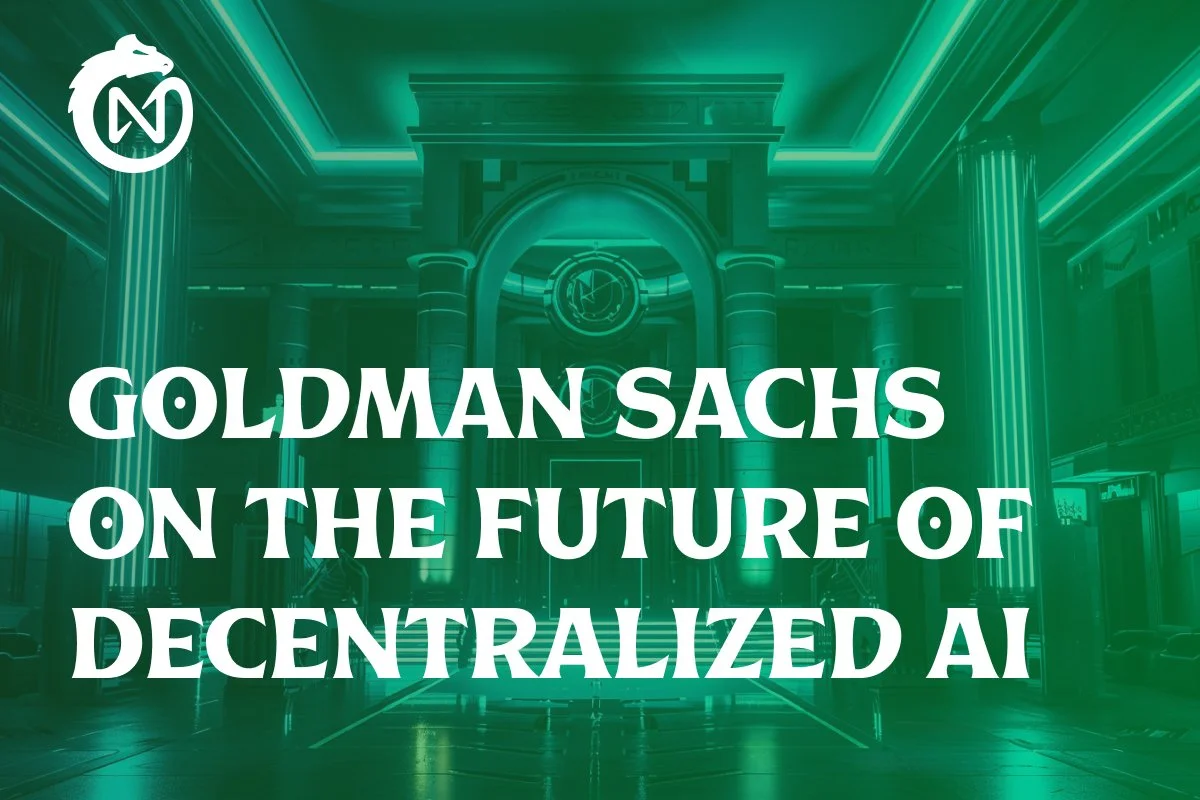Goldman Sachs on the Future of Decentralized AI
The investment banking company of Goldman Sachs recently put forth their report on the emergence of AI in regards to economic growth, citing both its potential and disruptive capabilities specifically pertaining to productivity. In short, they stated that while AI’s potential is incalculable, there is no denying its power in being able to “generate content that is indistinguishable from human-created output and to break down communication barriers between humans and machines…” These days, thanks to advances in computation and data storage, a centralized AI is not difficult to come by with ChatGPT, Claude, and Gork being the most well-known examples. Nevertheless, in the same way that cryptocurrency became the decentralization of money, so too shall there be the decentralization of AI programs and even more so the advantage over their centralized counterparts.
The main point of contention that Goldman Sachs brings to light regarding AI is the disruption of the workforce. With AI, they estimate that “one-fourth of current work tasks could be automated by AI in the U.S.” More accurately, those with administrative positions are more likely to be displaced than those in more physically demanding positions. Globally however, Goldman Sachs states that an entire 18% of all work could be automated with AI.
At face value, these figures can be quite alarming. On the contrary, studies have shown employers that have already made use of AI “experience higher labor productivity, with estimates generally implying a 2-3pp/year boost.” In other words, despite the initial disruption of labor, the early adopters of AI have actually become more productive than they ever were before.
Now AI in the workforce is all well and good but what makes a potentially decentralized AI model more valuable than say a centralized model such as ChatGPT? It really boils down to a few key points, those being transparency, safety, payments, and network effects. It's important to note that it's not that centralized AI doesn't have these characteristics but more the questions that are raised when talking about how these factors fit into an AI model.
Transparency
To begin, we have the idea of transparency. With a centralized model, you have no insights into who controls the model or as to when any potential changes are being rolled out onto said model. Essentially, what you see is what you get and you cannot peer behind the scenes to see how the model works and so forth. In a decentralized model, you have the ability to look at the inner workings and see how it is controlled which helps eliminate the potential for bias or misuse. The network is grown by the people instead of one person or party.
Safety
In sort of the same vein we have the idea of safety. The biggest factor when looking at this through the lens of a centralized model is the question of “Can I trust this AI? Do I trust the people behind it?” or perhaps you might question the implementation of an AI whether it's a chat bot or an on-person device. With decentralization comes the potential of shared governance of an AI rather than placing your trust solely in another person or group.
Payments
Next, we have the idea of payments on the decentralized model. This would essentially mean AI models having their own bank accounts and being able to transact without needing to check with a person on the other end or group in order to use funds on whatever transaction it is trying to execute. This would reduce overall transaction costs and would allow for an increase in both economic activity and efficiency.
Network Effects
Finally, we come to the network effects of decentralized AI. This can mean having open-source integration within the model, that is, seeing how the network itself works and viewing the data it has kept. Think of it as a “plug’n’play” in which you take a decentralized AI and give it some characteristics of an open-source model and some of the services that can come with it like managing payments and personal info. With a centralized model again what you see is what you get, there’s no taking it and refitting it for another model with different specifications.
In essence, the adoption of AI in the modern technological landscape is all but certain. Even the big banks like Goldman Sachs cannot deny the coming potential of AI within the workforce and even more so the world. With centralized AI comes people that would like some level of control over said AI. People that need to be trusted to do right by those that come to their AI models for solutions or ideas. On the other side of this coin we find the decentralized AI model in which people are called to the idea of shared governance and accountability over their respective model. We’ve already seen and will continue to witness the effects of decentralized currency. Is it so crazy to see the same effects in AI?




